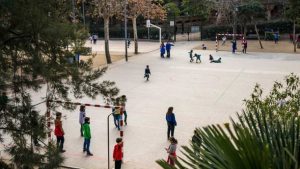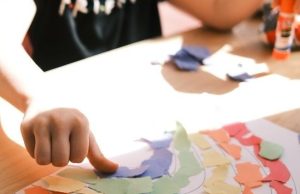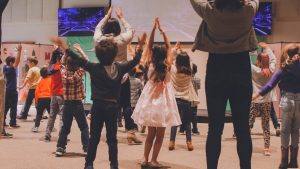Unschooling is an alternative – set ’em free – approach to child education. Families engaging in unschooling have copious praise for the educational strategy. Without a stifling regimen of standardized tests and rote learning, they claim, it allows kids to be their truest selves, pursuing their passions and educating themselves effectively through real experience.
But because this pedagogical revolution remains on the fringe, scientific studies have been sparse. Naysayers point to this disparagingly, which may have curtailed the rise of unschooling. Yet the tides are turning. A compelling body of research is now emerging; one that supports it, revealing positive and sometimes surprising results.
So let’s dive in and examine the evidence behind unschooling.
Science Agrees, Unschooling Works [infographic]

Digging Into the Research
1) DEVELOPS INTRINSIC MOTIVATION AND SELF-DETERMINATION
Motivation and determination are key factors in success, and it’s a proud moment indeed when we see our kids take control of their own destiny. The self-guided learning and freedom that occur when children are unschooled may give rise to earlier and more significant feelings of self-motivation and self-determination.
One of the most relevant studies on unschooling, which was published in The Journal of Educational Alternatives in 2015, assessed 75 adults who had been unschooled for at least the years that would have formally been their last two years of high school. Their responses revealed that in many cases in which parents provided supportive rather than supervisory roles in the educational process, adult children of unschooling felt that they were more self-directed and motivated as a result of their experience. (Source)
Key study/paper: Peter Gray & Gina Riley. (2015). “Grown unschoolers’ evaluation of their unschooling experiences: Report I on a survey of 75 unschooled adults”. The Journal of Educational Alternatives 4(2):8-32.
Source: www.researchgate.net/publication/305720405_Grown_Unschoolers_Evaluations_of_Their_Unschooling_Experiences_Report_I_on_a_Survey_of_75_Unschooled_Adults
2) STIMULATES PASSION FOR LIFE-LONG LEARNING
When we give kids room to pursue their passions, they develop a natural love of learning. The principles of unschooling are about just that – giving children a chance to embrace what matters to them, so learning new things has a consistently positive connotation to them from the start.
The 75 adults who were assessed in the 2015 study, which was performed by fervent unschooling activist Peter Grey and educator and psychologist Gina Riley, were interviewed regarding their pursuit of higher education. 83% of those assessed reported that they went on to enroll in formal higher education, and 44% reported being enrolled in or having completed a bachelor’s degree program. That means that statistically, children who had been fully unschooled were more likely to pursue a bachelor’s degree than those who had some formal schooling or home schooling during their K-12 years. (Source)
Key study/paper: Ramona M Barros, Ellen J Silver, Ruth Ek Stein. (2009). “School recess and group classroom behaviour”. Pediatrics, 123(2),431.
Source: www.researchgate.net/publication/305720294_Grown_Unschoolers’_Experiences_with_Higher_Education_and_Employment_Report_II_on_a_Survey_of_75_Unschooled_Adults/citation/download
3) IMPROVES SELF-DIRECTED EXECUTIVE FUNCTION
Setting goals, making schedules, planning and problem solving are all a part of a skill set called executive function. They’re aspects of life that are essential to long-term success, and we begin learning them during childhood. There’s reason to believe that unschooling can play a role in improving kids’ self-directed executive function.
A 2014 study published by Frontiers in Psychology assessed the activity levels of 70 six and seven-year-old children over the course of a week via a parental interview. This data was used to determine how the children’s structured activities or lack thereof correlated with their self-directed executive functioning as measured by a common verbal fluency test. Children who spent more time in unstructured activities had higher self-directed executive functioning, with structured activities having the opposite effect, in relationships researchers noted to be “robust and specific”. (Source)
Key study/paper: Jane E. Barker, et al. (2014). “Less-structured time in children’s daily lives predicts self-directed executive functioning” Frontiers in Psychology, 5:593.
Source: www.ncbi.nlm.nih.gov/pmc/articles/PMC4060299/
4) RELIEVES STRESS AND ANXIETY
Stress and anxiety aren’t just adult emotions, they are a part of being human. As much as we want to protect our kids from those feelings, the traditional school environment can be a significant cause of stressful, anxious feelings for some kids. There’s evidence that demonstrates that the kind of spontaneous, child-directed free play that unschooling encourages can help to relieve stress and anxiety in kids.
A 2014 study on spontaneous free play published in international peer-reviewed pediatrics journal Children extrapolates on the virtues of self-directed free play, noting that opportunities for kids to choose their own activities can help them develop a more complete understanding of themselves. This, in turn, can help prepare them with the coping tools they need in order to cope with feelings of stress and anxiety. (Source)
Key study/paper: Jane Hewe. (2014). “Seeking balance in motion: The role of spontaneous free-play in promoting social and emotional health and early childhood care and education”. Children, 1(3):280-301.
Source: www.mdpi.com/2227-9067/1/3/280/htm
5) BOOSTS CREATIVITY
Creative outlets are great for kids, giving them an avenue for self expression and an opportunity to develop a tangible skill. When they have the opportunity to express themselves creatively, they are better able to express and cope with their feelings. One study has shown that the kind of free play that kids engage in during unschooling can increase their creative output.
A 2002 study published by pediatric medical journal Early Childhood Development and Care examined the role that unstructured activities play in enhancing the creativity of children. 52 kids ages six and seven were divided into two groups. The first group was given an unstructured creative play opportunity, while the second was given a rote learning task. Subsequently, the children were asked to create a tissue paper collage of a creature. Judges noted that children who had engaged in free play utilized more colors and pieces in their creative effort, results which were replicated when the experiment was repeated a few days later with the same children switching roles. (Source)
Key study/paper: Paul Howard-Jones, et al. (2002). “The Effect of Play on the Creativity of Young Children During Subsequent Activity” Early Child Development and Care, 172(4):323-328.
Source: www.bristol.ac.uk/education/people/academicStaff/edpahj/publications/play.doc
6) INCREASES FAMILY CLOSENESS AND HARMONY
A close, warm family bond that’s peaceful and harmonious is a nearly universal goal; kids may not actively know it, but it’s something that contributes to their emotional well being and sense of self. It’s common sense that these bonds are developed by sharing as much family time as possible, so it’s not surprising that unschooling may play a role in helping families stay close.
A 2013 study by Peter Gray, published in the Journal of Unschooling and Alternative Learning, invited 232 self-identified unschooling families with at least one child over five years old to respond to a survey about their experiences with unschooling. While it became evident that the nature of familial unschooling practices can vary significantly, many respondents established that their experience had created a closer bond between themselves and their children and created better sibling relationships overall. (Source)
Key study/paper: Peter Gray. (2013). “The challenges and benefits of unschooling, according to 232 families who have chosen that route”. Journal of Unschooling and Alternative Learning, 7(14).
Source: www.researchgate.net/publication/305720522_The_Challenges_and_Benefits_of_Unschooling_According_to_232_Families_Who_Have_Chosen_that_Route
7) BUILDS PERSONAL RESPONSIBILITY
Establishing a sense of personal responsibility helps kids understand why it’s important to keep their word and take accountability for their actions. This isn’t a lesson everyone learns by adulthood, but shirking it can mean problems at home, work and socially when they’re older – as such, the sooner they begin to grasp the concept, the better. The freedom unschooling provides can also double as a teaching tool when it comes to understanding personal responsibility.
Peter Gray and Gina Riley’s 2015 self-evaluated study of unschooling experiences in adult children revealed that adult children of unschooling feel their experience was beneficial for the role it played in teaching them a sense of personal responsibility. When children are allowed to independently explore and pursue their interests, they are given direct opportunities to see the cause and effect behind events and the role their actions play, quickly realizing that it is up to them to tackle a situation that they’ve created. This allows them to do so more confidently in future endeavors. (Source)
Key study/paper: Peter Gray, Gina Riley. (2015). “Grown unschoolers’ evaluation of their unschooling experiences: Report I on a survey of 75 unschooled adults” The Journal of Educational Alternatives 4(2):8-32.
Source: www.researchgate.net/publication/305720405_Grown_Unschoolers_Evaluations_of_Their_Unschooling_Experiences_Report_I_on_a_Survey_of_75_Unschooled_Adults
8) DEVELOPS ADVANCED THINKING SKILLS
Solving problems, making educated guesses and using deductive reasoning all fall under the umbrella of advanced thinking skills, which some kids naturally develop faster than others. There’s ways that we can offer skill boosts to our children in these areas, but one of the best ways to let them master the way they interact with the world and figure things out is to give them the room to learn outside of the classroom environment.
One 2018 study published in the Journal of Unschooling and Alternative Learning assessed a group of 46 home schooled children aged 6-12 to determine the variance between children receiving traditional schooling and those receiving home schooling with regard to advanced thinking skills. It rated home schooled children on their ability to make inferences, create and identify sequences, solve problems and determine outcomes and causes. The results demonstrated that children educated at home seem to develop these skills in a more advanced way, perhaps owing to their comfortable home environment and the individualized attention they receive. (Source)
Key study/paper: Richard Medlin, Jessica Butler “Thinking skills, academic intrinsic motivation, academic self-concept, and academic independence in home schooled children” Journal of Unschooling and Alternative Learning, 12:24.
Source: https://jual.nipissingu.ca/wp-content/uploads/sites/25/2018/10/v12243.pdf
9) ENCOURAGES DISCOVERY AND PURSUIT OF OWN INTERESTS
Many interests, passions and hobbies find their roots in childhood experiences. This is especially true when children are given the freedom to pursue their interests outside of a traditional classroom environment, where they are able to spend more time pursuing the topics and activities that resonate with them personally. These opportunities are especially present during unschooling thanks to its self-directed nature.
When adult children of unschooling were asked to self-assess the influence that unschooling played on their sense of discovery and pursuit of their own interests, the responses gravitated toward the positive. Many respondents noted that their unschooling experience was a positive one, leaving them with both the time and freedom they needed to discover and experiment with the world around them and pursue the things they felt passionate about, encouraging a lifelong love of discovery and learning. (Source)
Key study/paper: Peter Gray, Gina Riley. (2015). “Grown unschoolers’ evaluation of their unschooling experiences: Report I on a survey of 75 unschooled adults”. The Journal of Educational Alternatives 4(2):8-32.
Source: https://academicworks.cuny.edu/cgi/viewcontent.cgi?article=1514&context=hc_pubs
10) NURTURES SOPHISTICATED SOCIAL SKILLS
Some of the proponents of traditional schooling argue that home schooling and unschooling has the potential to deprive children of social interaction. However, when executed thoughtfully by parents, one study has shown that unschooling may actually provide children with a broader range of experiences to draw from.
In Gray and Riley’s 2015 study on adult children of unschooling, parents of those surveyed were asked to report back on their children’s social lives during their formative academic years. In many cases, parents of unschooled children reported that their children’s social interaction as unschoolers was still dynamic and consistent. It also may take place with a more unique range of people than the classroom environment provides, allowing children to become more socially adept. (Source)
Key study/paper: Peter Gray, Gina Riley. (2015). “Grown unschoolers’ evaluation of their unschooling experiences: Report I on a survey of 75 unschooled adults”, The Journal of Educational Alternatives 4(2):8-32.Source: www.psychologytoday.com/sites/default/files/Published%20Grown%20Unschoolers%20I.pdf
11) IMPROVES TASK FOCUS
Attention span and focus help kids stay on task and pay greater attention to detail, but they can be notoriously difficult to master, even for some adults. One of the reasons for this is that famous line about “all work and no play” – the human mind, especially when it’s still developing, needs self-directed, non-stressful free time. Research has demonstrated that for unschooled kids, self-directed play can lead to improved focus.
A 1995 study published in the American Educational Research Journal assessed groups of elementary school students in kindergarten, second and fourth grades in order to determine the role that the timing of recess plays in helping children to stay on task. The results of the study demonstrated that as children are deprived further of unstructured play time – in this case, recess – their attention span wanes. The experiment was further repeated with a secondary group of second and fourth graders with similar results. (Source)
Key study/paper: Pellegrini A. et al. (1995). “The effects of recess timing on children’s playground and classroom behaviours”. American Educational Research Journal 32(4):124-127
Source: www.researchgate.net/publication/240801853_The_Effects_of_Recess_Timing_on_Childrens_Playground_and_Classroom_Behaviors
12) TACKLES FEARS AND PHOBIAS
Fears, phobias and nervousness are all normal parts of childhood; the world can be scary, and kids are learning to interact with it for the first time. However, coping with feelings of fear and phobias comes more easily to some children than others, and the freedom to explore on their own can help kids feel more confident, diminishing their anxiety and helping them to overcome phobias while they’re young.
A 2011 study published in Evolutionary Psychology tackled the role that thrill-seeking, risk-taking activities play in helping children to overcome phobias and feelings of fear. The results demonstrated that when children engage in play that involves minor, natural and age-appropriate risk-taking, they are more able to overcome fears and phobias, allowing them to feel more confident and in control of outcomes. (Source)
Key study/paper: Bartes E, Sandseter H. (2011). “Children’s Risky play from an evolutionary perspective: The Anti Phobic effects of thrilling experiences”. Evolutionary Psychology, 9(2):257-284.
Source: journals.sagepub.com
13) BOOSTS PROBLEM-SOLVING SKILLS
Tackling problems and challenges is a skill that takes developing, and when we give kids the freedom to explore and think for themselves, their interactions with the world provide natural lessons that double as skill boosts when it comes time to think critically. One of the older studies we’ve tackled reinforces a theory that many unschooling parents embrace, which is that unstructured, self-led education often provides equivalent or enhanced development of logic and life skills.
A 1979 study published by Child Development regards the way that opportunities for self-directed play can positively impact a child’s ability to use problem solving skills. In this study, a group of four year old children were evaluated. Half the group received training on a simple assembly activity, while others were given a free play opportunity instead. The two groups assembled the puzzle with equal speed and competence. When an additional layer of complexity was added to the project, children who’d engaged in free play more readily assembled the new puzzle, asking fewer questions along the way. (Source)
Key study/paper: Peter K. Smith and Susan Dutton. (1979). “Play and training in direct and innovative problem solving” Child Development, 50:830-836.
Source: https://zero.sci-hub.tw/5130/5421bca0a39de624d61117ea4bbca248/smith1979.pdf
14) ENCOURAGES ENTREPRENEURSHIP
Formal classroom education isn’t the only pathway to future success. In fact, there’s reason to believe that letting kids direct their interaction with the world plays a role in their confidence and competence, driving a lifelong love of learning and goal-focused pursuits that can lead to increased rates of both higher education and future entrepreneurship.
In Gray and Riley’s 2015 study, self-reporting adult children of unschooling were assessed on many factors, among them being their post-unschooling formal higher education rates as well as their level and manner of employment. 44% of respondents were in pursuit of or had earned a bachelor’s degree. Most were financially independent through gainful employment despite being generally young, and 63% of the unschooled children who responded have gone on to be entrepreneurs who are maintaining their own businesses. (Source)
Key study/paper: Peter Gray, Gina Riley. (2015). “Grown Unschoolers’ Experiences with Higher Education and Employment: Report II on a Survey of 75 Unschooled Adults”. The Journal of Educational Alternatives 4(2):33-53
Source: www.researchgate.net/publication/305720294_Grown_Unschoolers_Experiences_with_Higher_Education_and_Employment_Report_II_on_a_Survey_of_75_Unschooled_Adults/citation/download
15) READING HAPPENS NATURALLY, OFTEN BECOMING A PASSION
As children learn to read, their world expands dramatically. Although it’s long been thought that teaching reading needs to be a rote, hands-on process, there’s reason to believe that children who are raised in environments where reading is the norm will organically begin to learn and love reading without much prompting as long as a learning disability is not present.
In a 2018 study by educator and psychologist Gina Riley, the experience of reading education in unschooled children was assessed for value. A group of 28 adult participants who were unschooled children reported that they learned to read through the intrinsic motivation created by being frequently read to and witnessing reading in their homes. Moreover, learning to read in this way created a lifelong love of reading and literature in some unschooled participants. (Source)
Key study/paper: Gina Riley. (2018). “Exploring Unschoolers’ Experience in Learning to Read: How Reading Happens within the self-directed learning environment”. Journal of Unschooling and Alternative Learning, 12:24. Source: https://jual.nipissingu.ca/wp-content/uploads/sites/25/2018/10/v12241.pdf
CHANGING PERCEPTIONS
The way that society perceives education has changed drastically over the past few decades, with the definition opening up to alternative learning styles like unschooling. It’s not hard to see why it’s a method that continues to generate interest, as studies have shown that it may lead to children who are better adjusted, less fearful, more socially adept, and more likely to pursue both higher education and entrepreneurship among other benefits. More studies are needed on this magnificent push toward self-directed education for kids, but research has made it clear that for many children, unschooling is a dynamic road toward accelerated personal and intellectual growth.
References






